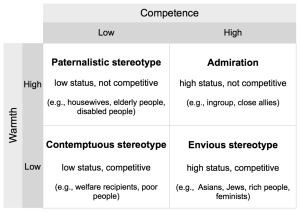Part of the argument in favour of empathy is that we are born empathetic creatures. However there are also other forces acting in the opposite direction. These lead to stereotyping as a sort of default behaviour when we don’t know anything else about the person or people standing in front of us. So stereotyping is about making quick assumptions about large groups of people without having checked that this is true of the specific people you are dealing with. In its favour, stereotyping can save time, can sometimes be true and can act as a conversation starter. Positive stereotypes can work in your favour too, but that is reinforcing unearned privilege.
As Nicole Slupetzky says in our podcast, we all stereotype to a greater or lesser degree. This means that we inevitably use stereotypes in the classroom, about our students and in relation to the material we are teaching. Nicole also talks about an intentional strategy of being more aware when we do use stereotypes in order to reduce our reliance on them in the future. As with empathy, so with stereotypes, being aware of your own stereotyping, is a big step forward toward managing its use.
A common exercise used in intercultural training is to collect the stereotypes commonly held about the groups that the people in the room represent. I think that this is a useful exercise as long as it does not stop after the collection of stereotypes. ie the collection has to be challenged and tested. Otherwise you end up just adding new stereotypes to those that people already held.
Oh the Scots are mean with their money are they? I didn’t know that.
And as so often stated in this series of blog posts, there are different levels of action from personal introspection and noticing, to dealing with stereotyping in the classroom, to having a clear strategy of questioning stereotypes at the institutional level.
Stereotypes in the classroom
As with the personal level, you can try to identify and call out stereotyping in the classroom. This is not always appropriate depending on the emotional temperature with which the stereotype is being expressed. It is probably easier to call out stereotypes you meet in materials than those voiced by your students. However if you nurture a general atmosphere of inquiry and respect for facts, it will be easier to question stereotypical statements under the banner of:
How do we know this is true?
It may even be possible to add an extra layer of objectivity by reference to a framework of stereotypes such as the one below by Fiske et al (2002). Perhaps you can add a few of your own in each quadrant.

The value of identifying and questioning stereotyping can be reinforced by referring to the negative effects of stereotyping, such as the Irish woman who was not given an interview as an English teacher in Korea because of the ‘alcohol problem’ in Ireland. Or the effect of reminding people about the stereotypes held about them just before they attempt something related to the stereotype. eg Women reminded that females are weaker at maths just before a maths exam will perform worse than those not reminded of the stereotype.
In the end, the use of stereotypes is almost sub-conscious and in order to combat the negative effects we need to be more aware of our use of stereotypes at a conscious level, before we can do something to reduce them in ourselves and in others.
Resources
A whole website about national stereotypes! http://www.nationalstereotype.com/
Do you stereotype? Harvard implicit test https://implicit.harvard.edu/implicit/
The effects of stereotypes: http://www.oldschoolteach.com/2014/11/an-open-letter-to-my-blackafrican.html#.VIFq5DHF98F
We explored many aspects of stereotypes in this Absolutely Intercultural show.
Reference
Fiske, Susan T.; Cuddy, Amy J. C.; Glick, Peter; Xu, Jun (2002). “A Model of (Often Mixed) Stereotype Content: Competence and Warmth Respectively Follow From Perceived Status and Competition” (PDF). Journal of Personality and Social Psychology (American Psychological Association) 82 (6): 878–902. doi:10.1037/0022-3514.82.6.878. PMID 12051578